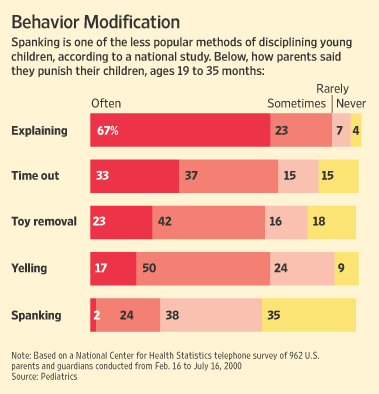The Wall Street Journal, New York, 14 October 2009The Numbers GuyNew Research on Spanking Might Need a Time OutStudies Aim to Settle the Longstanding Debate Over the Disciplinary Practice's Effects, but Statistical Shortcomings Persist
Three recent, widely reported studies on spanking children claimed to show that the disciplinary practice impairs cognitive development in children. Together, they held out the promise of providing the latest, definitive word on a passionate debate. Yet the three aren't likely to resolve anything. Many statisticians say they find in them less a firm conclusion than further proof of the difficulty of measuring spanking's impact. Statistical analysis of spanking's effects on cognition are clouded by many complicating factors. Effects can be attributed to the wrong cause, statisticians say; rather than spanking causing problems in children, it is possible that their existing cognitive problems can make spanking more likely. Moreover, any effects of spanking are difficult to measure and probably small. And unlike, say, a study on prescription drugs that removes a misleading placebo effect, no ethical study can assign some children to be spanked. Instead, parents must be trusted to remember and share their disciplinary practices. Spanking studies have a long history of fueling rather than settling the corporal punishment question. Earlier findings that spanking can contribute to aggressive behavior in children helped spur the American Academy of Pediatrics to study the issue and recommend against spanking in 1998 -- a conclusion that is still disputed. For instance, the American College of Pediatricians, which split from the academy over its backing of adoption by same-sex couples, supports spanking in certain instances. Den Trumbull, vice president of the group, says studies need to distinguish between appropriate spanking -- following a warning and done in privacy following specific, proscribed misbehavior -- and reactive, anger-based spanking. "Spanking gets a bad name of late, because parents tend to use it reactively, when having a bad day," Dr. Trumbull says. The most methodologically sound of the new studies, a number of researchers concur, was conducted by Lisa J. Berlin, a developmental psychologist at Duke University and published in the journal Child Development. She and her co-authors examined survey and observational data about 2,573 low-income toddlers, tracking the punishment they received and their scores on cognitive exams at ages 1, 2 and 3.
The researchers were able to trace relationships over time, for instance showing that spanking, but not verbal punishment, at age 1 predicted aggressive behavior at age 2 and lower mental development scores at age 3. Conversely, they found that kids with underlying problems such as aggressive behavior aren't later spanked more frequently. So the point of criticism of many studies -- that problems cause spanking and not the other way around -- is addressed in this research. But researchers noted that the study didn't remove all possible explanations for why some children develop faster than others, such as their parents' intelligence. Dr. Berlin used maternal educational levels as an imperfect proxy for parents' intelligence. Daniel Mundfrom, a statistician at New Mexico State University in Las Cruces, says that even without accounting for other factors, spanking at age 1 explained less than 1% of the variation in cognitive ability at age 3. In other words, maybe spanking does lower intelligence, but not by much. Dr. Berlin, who says she isn't an advocate for or against spanking, says she conducted the study because prior studies raised alarms over spanking but also because she hoped to address their shortcomings. Prior studies may have been flawed, she says, but their conclusions may not have been, she says. Her results "are highly consistent with the large majority of the spanking research showing spanking's negative effects." Two other studies released last month were too flawed to help settle the debate, some researchers say. They were conducted by Murray Straus, a sociologist at the University of New Hampshire and an outspoken antispanking advocate. In one peer-reviewed study, published in the Journal of Aggression, Maltreatment, and Trauma, Prof. Straus and Prevention Research Center senior research scientist Mallie J. Paschall examined how 1,510 children were disciplined and how they scored on standardized cognition tests. The researchers found that children aged 2 to 4 who weren't spanked gained an average of five points, equivalent to points on an IQ test, four years later compared with those who had been spanked three times or more per week. While the researchers made efforts to assure that other explanations weren't possible, they didn't go as far as Dr. Berlin did. They didn't take into account whether the children exhibited signs of being difficult or oppositional, and whether children received physical punishment beyond spanking, which could create emotional problems that affect their development. In addition, the study failed to dispense with an alternative explanation for reasons why some kids scored lower on cognitive tests. "It also could be that kids who got spanked more...were already developing at a slower rate," says Marjorie Gunnoe, a professor of psychology at Calvin College in Grand Rapids, Mich. The Berlin study addressed this concern by showing that kids who were developing slower at one age weren't getting spanked more later. In an email, Prof. Straus defends the research, saying it is "a very solid study methodologically." A press release from his university about the research noted that the sample was "nationally representative." A second study of his, which was widely reported in the press and presented at a conference about violence, shows that people in countries where spanking is most prevalent have lower average IQs. Prof. Straus concedes that the methodology was flawed and that spanking may not account for the differences in average national IQs. He says he presented the data on national IQ in part because it corroborated his other study. "The questionable statistics are so consistent with the statistics in the other paper," he says, adding that his second study can provide "a field day writing about questionable statistics." Some statisticians agree. For one thing, the results are skewed by a relatively small number of countries with high rates of spanking and especially low average IQs, particularly Tanzania and South Africa -- where about a third of university students reported being spanked a lot before age 12, and where average IQ rates stood at 72. Excluding these countries, "the line would be much closer to flat, indicating little or no relationship," says Dr. Mundfrom. Attributing cognitive problems in children to spanking is hard enough. But then saying it is a major reason behind the lower IQ of a nation's entire population is even trickier because there could be a new raft of potential causes. Martin Wells, a statistician at Cornell University, re-ran the statistical test to check whether regional variations in IQ -- which is lower in Latin America and Africa -- could account for the IQ differences Prof. Straus found. After accounting for regional variations, Dr. Wells found the effect of spanking vanished. Dr. Wells plans to use the Prof. Straus's research in the classroom to demonstrate why it is important to consider alternative explanations. Copyright 2009 Dow Jones & Company, Inc. All Rights Reserved The News-Reporter, Washington, Georgia, 22 October 2009OpinionsUniversity studies might fool some parents into thinking that spanking lowers kids' IQ
There have been two or three new university studies out recently that said spanking would lower a child's IQ, and if you're not discerning, you might fall for their combination of bad science and blind bias. Now, I'm not here to argue the merits of spanking, pro or con. That's not the point at all. My point is that you can't believe these university studies, or the news stories about them. They make great headlines, but they make absolutely bogus science. Murray Straus, a professor of sociology at the University of New Hampshire, says that according to two studies he has conducted, children who are spanked more have statistically lower IQs by three to five points than children who aren't spanked. That means, he insists, that spanking causes lower IQ in children. Pardon my French, but that's bull. It's like saying that, since basketball players are statistically taller than average, playing basketball makes you taller. They're dishonest studies because they imply causality, when they merely point out correlation. Straus finds places where spanking is more common, and low IQ is more common, and swears that one causes the other. It just isn't true. The studies are academically dishonest because Straus has been trying to take away parents' right to raise their children for decades, wanting to make spanking a Federal crime. His slanted studies mix children who underwent "severe corporal punishment" with children who are given the slightest form of hand-spanking, and say the effect is the same. What he did was pass out questionnaires in 32 countries around the world that asked adults if they were spanked as children or were given other discipline such as time out. Countries that had the highest rates of spanking, like Tanzania and South Africa, he said, had the lowest national IQ, and he insisted that spanking was solely responsible for the nation's low intelligence. What Professor Straus and his cohorts purposely overlook is that people around the world have a wide range of intelligence levels, and a wide range of cultural standards, that are built in. You inherit your smarts to a great degree from your parents, and they're taught their parenting skills from their culture. His studies would only make sense if we all started out with the same level of intelligence, and obviously we don't. In fact, I'm very suspicious of his data, because he insists that the "average national IQ" of African populations is quite low, about 72, while the average IQ of European populations is about 100, and it's because Africans spank their children more than Europeans. While many other studies have documented this IQ difference, none have come to his bogus conclusion on the cause. Now, it makes sense that the smarter the parent, the more options they may find to spanking. Educated, intelligent parents should have a more abstract and intelligent approach to problem solving, and realize that, while spanking can be a useful tool to civilize a child, there are many other methods that can achieve the same results. But one does not cause the other. That's ridiculous. As I said, it's not my purpose to argue the pros or cons of spanking. I just want to warn parents -- and everyone else -- not to believe what they hear on the news just because some academic goober has twisted the facts to fit his agenda. Be wise consumers of the news, be skeptical of university studies, and certainly don't raise your children based on "facts" some professor has twisted for his own ends. |
About this website |

 By Carl Bialik
By Carl Bialik

